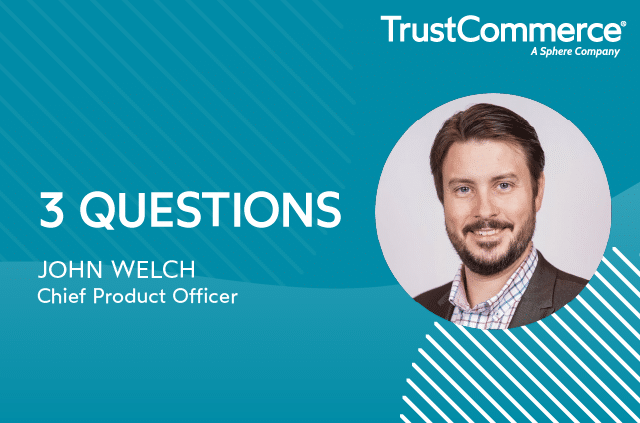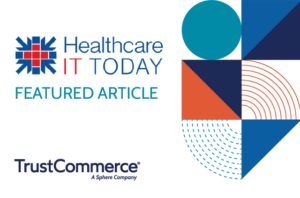3 Questions with John Welch, Chief Product Officer
We recently sat down with John Welch, Chief Product Officer of TrustCommerce, a Sphere company, to learn about the role of payments for independent software vendors (or ISVs). In this Q&A, he touches on key factors for ISVs to consider as they review their payments strategy for 2023 and beyond.
John leads the Product organization and drives the roadmap for TrustCommerce’s payment and healthcare-focused solutions. Originally from London, England, he is an internationally minded payments expert with over 15 years of experience working for some of the largest payment providers and banks in the world, including leadership roles at Wells Fargo, JPMorgan Chase, WorldPay, and MasterCard. John has supported ISVs and payments partners throughout his career, helping them optimize payment processes and drive growth.
Q: SaaS companies, often called independent software vendors (ISVs), are increasingly implementing embedded payment solutions. What are some of the reasons why?
A: As consumers, we like to focus on the task at hand, whether that’s subscribing to a new video streaming service, ordering food for delivery, or a ride to take us out for the evening. Integrated Software Vendors, or ISVs, provide the software to deliver these services seamlessly. However, historically, the act of consumers having to find their payment instruments, be that a card or check, and provide the sensitive payment details to the merchant or ISV has been disruptive to the consumer experience, littering the internet with abandoned shopping carts.
Embedded payments help solve this pain point by enabling ISVs to offer payment solutions from directly within their software, leading to seamless consumer interactions and increased transaction volumes.
Similarly, embedded payments also give ISVs and their merchants an improved experience, enabling them to better control workflows, generate accurate reports, and optimize consumer engagement.
Q: What are key considerations for SaaS companies when choosing payments technology?
A: ISVs should carefully consider their individual use-cases and determine which verticals they operate in before choosing a payments or technology provider. There are specific capabilities which play an important role when embedding payments, and which can help streamline experiences for both ISVs and consumers, for example:
Omni-channel payment acceptance
Omni-channel payments offer a seamless payment solution that works across cardholder present, e-commerce, and Mail Order/Telephone Order (MOTO) environments, enabling consumers to have a consistency with the ISV and their merchant regardless of which channel they are using at the time.
An example of an optimized omni-channel payment platform experience would be a consumer purchasing goods in a retail outlet by presenting their card at the register, storing their card on file with the merchant during the transaction, then later using that same card to purchase an item from the merchant’s website using the card they presented in store.
Tokens are critical in order to offer secure omni-channel payment options, as they allow for a payment method to be assigned to a consumer regardless of where that consumer interacts with the ISV or merchant. Tokens enable merchants to exchange sensitive payment card information for a non-sensitive value which can be used to initiate transactions and perform transaction-related activities, such as refunds and requesting transaction details.
Additionally, tokens help ISVs and merchants decrease their exposure to PCI DSS requirements, thereby reducing their technical, operational, and compliance overheads, saving on internal resources and ensuring that their consumers’ payment details are safe in the event of a data breach.
Reporting
Comprehensive reporting enables ISVs and merchants to monitor their transactional activity and effectively manage their cashflow and is therefore an important tool for any merchant. ISVs and merchants should review the reporting capabilities provided by their technology and payments partner to ensure their reporting needs are covered and they can obtain the data at the frequency they need it to effectively run and optimize their business.
Q: For ISV healthcare companies serving the healthcare market, choosing a payments partner with healthcare expertise can go a long way. Can you share a few reasons why?
A: It’s important that any partner that you choose to work with deeply understands the vertical you operate in. This way you can rest assured that they have specialized their products and services to support your business and help you drive the best experience for your customers.
TrustCommerce, for instance, has specialized in the healthcare vertical for over 20 years, and is able to propose and offer products and services to help solve healthcare industry nuanced payment complexities, such as providing EHR-integrated payment solutions which are also HIPAA and HITRUST compliant or support for things like IIAS for HSA and FSA cards.
Additionally, partnering with an expert in your field enables you to benefit from their expertise and lessons learned from working with other similar organizations.
As payment strategies continue to evolve, it’s crucial for ISVs to team up with a payment partner that provides innovative payment solutions. By prioritizing omni-channel payments acceptance, payment tokenization and reporting advantages, ISVs can ensure that they’re meeting the needs of their customers in this ever-changing digital environment.
Interested in learning how TrustCommerce’s end-to-end payment solutions can seamlessly integrate with your independent software vendor? Speak with a specialist today.






